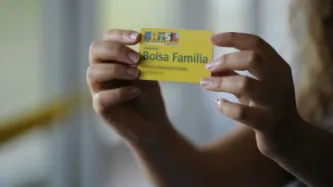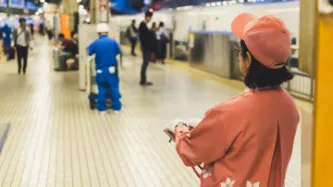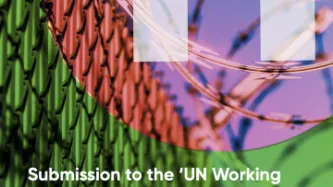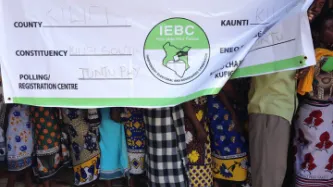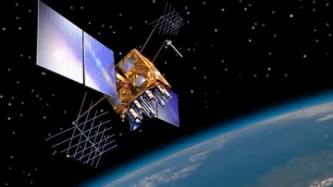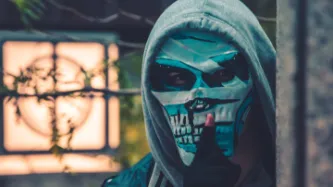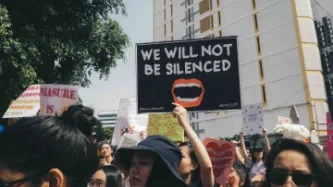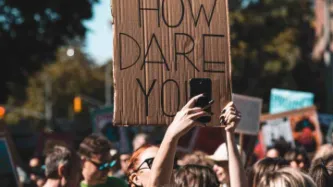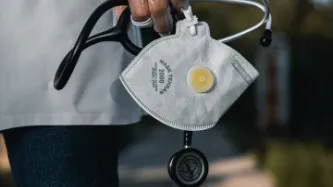Search
Content type: Examples
At least four law enforcement agencies in the US - two in California, and one in each of Maryland and Texas - are using drones to communicate with homeless people about maintaining social distance because encampments are located in areas that are difficult to access and police do not have to visit in person. Critics complain that the move increases encampment dwellers' already-high distrust in government. Many of the drones are being donated by the China-based drone company DJI as part of the…
Content type: Examples
The Internet Freedom Foundation has sent a legal notice to the Broadcast Engineering Consultants India, Limited (BECIL), a public sector undertaking under the Ministry of Information and Broadcasting, calling on the organisation to modify a tender seeing procurement of a "Personnel Tracking GPS Solution" and "COVID-19 Patient Tracking Tool" intended for the organisation's employees.
IFF is concerned that the procurement items, while nominally intended to address health risks, will certainly…
Content type: Examples
The automated facial recognition company Clearview AI has suggested to US federal and state authorities that its facial biometrics could leverage cameras already in place at gyms and retailers in order to identify individuals in the interests of contact tracing.
Simultaneously, the company is asking for a stay in a privacy lawsuit in federal court in Illinois under the state's Biometric Information Privacy Act. The company wants the case to be moved to the Southern District of New York, where…
Content type: Examples
To speed up daily temperature checks, Amazon has installed thermal cameras to screen workers for coronavirus symptoms in its warehouses around the world. Cases of COVID-19 have been reported at more than 50 of the company's US warehouses. Thermal cameras will also replace thermometers at staff entrances to many of Amazon's Whole Foods stores. Workers have claimed it is almost impossible to socially distance inside the warehouses.
Source: https://www.bbc.co.uk/news/technology-52356177
Writer:…
Content type: Long Read
This article has been written by our partner organisation InternetLab. Read this article in Portuguese here.
Over the last months, the organisation InternetLab has researched privacy, data protection, gender, and social protection, focusing on the beneficiaries of the Bolsa Familia Program (PBF). The PBF is the most extensive Brazilian cash transfer program, and its functioning is linked to CadÚnico, a database that comprises 40% of the country’s population. Moreover, it is a program whose…
Content type: Examples
The Israeli company Cellebrite, best known for providing hacking software to help law enforcement agencies get inside suspects' iPhones, is now pitching its technology to help authorities pull the location data and contacts off the phones of newly-diagnosed COVID-19 patients in order to "quarantine the right people", as the company emailed to the Delhi police force.
Cellebrite is one of at least eight surveillance and cyber-intelligence companies that are attempting to repurpose their…
Content type: News & Analysis
As parts of the world are preparing to go back to factories, offices, and other workplaces, or in the case of Amazon, trying to make continually unsafe workplaces less hazardous, we must be on the watch yet again for profiteering, data-grabs, and surveillance as a solution to an undefined problem.
Many of the measures are predicated on the idea of catching employees who are sick. But, why do employers think that employees are or will lie about their health? Is it because they love their jobs…
Content type: Advocacy
Privacy International responded to the call for submissions of the Working Group on the use of mercenaries as a means of violating human rights and impeding the exercise of the rights of peoples to self-determination on role of private military and security companies in immigration and border management and the impact on the protection of the rights of all migrants.
This submission builds on PI’s research and reporting highlighting examples of the involvement of private companies in…
Content type: Case Study
The run up to Kenya’s 2017 elections was extremely tense. Kenya has a history of violently fought elections and there was fear this election would be no different. It was in this tense environment, that companies like Cambridge Analytica and Harris Media – and their digital offerings - got involved in the election campaigns.
Cambridge Analytica’s business model is by now familiar, they compiled a huge amount of data points, often through illegal means, to create profiles on individuals –…
Content type: Explainer
In a scramble to track, and thereby stem the flow of, new cases of COVID-19, governments around the world are rushing to track the locations of their populace.
In this third installment of our Covid-19 tracking technology primers, we look at Satellite Navigation technology. In Part 1 of our mini-series on we discussed apps that use Bluetooth for proximity tracking. Telecommunications operators ('telcos'), which we discussed in Part 2, are also handing over customer data, showing the cell towers…
Content type: Long Read
On 12 April 2020, citing confidential documents, the Guardian reported Palantir would be involved in a Covid-19 data project which "includes large volumes of data pertaining to individuals, including protected health information, Covid-19 test results, the contents of people’s calls to the NHS health advice line 111 and clinical information about those in intensive care".
It cited a Whitehall source "alarmed at the “unprecedented” amounts of confidential health information being swept up in the…
Content type: Long Read
Today is 1st May, an international day of protest. It also marks a year since PI launched our new programme of work called ‘Defending Democracy and Dissent’.
One year on we find ourselves in a situation where 1 May protests in the streets will not be going ahead. Rights have been restricted around the world. Sadly we’re seeing some actors exploit this public health crisis to enhance their own power, expanding surveillance and opportunism.
Against this challenging back-drop we wanted to…
Content type: Long Read
UPDATE 21/07/2020: On Monday July 20th, the Israeli parliament approved a new bill allowing the Ministry of Health to rely again on the Intelligence Services to track people who may have been exposed to Covid 19 when the number of new cases reaches 200 and above per day. The authorisation is then granted for three weeks and can be extended if the numbers have not decreased. The new law will be effective until January 2021. As of July 21st and for at least the next three weeks, the Intelligence…
Content type: Case Study
IMSI catchers – International Mobile Subscriber Identity catchers – are a particularly intrusive technology being used by police to monitor protesters and intercept their personal information and communications.
IMSI catchers have been used - officially or in secret - across the globe to monitor protests, including in the US and Germany; in the UK, police forces have refused to disclose any information on their use but documents obtained by the Bristol cable show that nine police forces have…
Content type: Press release
Photo by Ashkan Forouzani on Unsplash
Today Privacy International, Big Brother Watch, medConfidential, Foxglove, and Open Rights Group have sent Palantir 10 questions about their work with the UK’s National Health Service (NHS) during the Covid-19 public health crisis and have requested for the contract to be disclosed.
On its website Palantir says that the company has a “culture of open and critical discussion around the implications of [their] technology” but the company have so far…
Content type: Examples
Police will be barred from accessing metadata collected by Australia's proposed coronavirus contact tracing app, which will be able to identify when users have been 1.5 metres of each other for more than 15 minutes, Australia's government services minister, Stuart Robert, and prime minister, Scott Morrison, have promised. Only state health investigators will access the data, even though experts say that the 2018 telecommunications laws potentially allow law enforcement access. Critics are…
Content type: Examples
The Turkish Health Ministry's Pandemic Isolation Tracking Project is using mobile device location data to track patients diagnosed with COVID-19 and ensure they obey the government's quarantine requirements. Violators will be sent warning messages and their information will be shared with the police if they do not return to isolation. Law enforcement officers can access individuals' information during road stops. Before launching the system, the Communications Directorate obtained permissions…
Content type: Examples
When the phone belonging to an American University student in Taiwan, who was subject to 14 days' quarantine after returning from Europe, ran out of battery power, in less than hour he had received phone calls from four different local administrative units, a text message notifying him he would be arrested if he had broken quarantine, and a visit from two police officers. The phone tracking system uses phone signals to triangulate locations of the more than 6,000 people subject to home…
Content type: Examples
By May 11, the Swiss Federal Office of Public Health, working with EFPL and ETH Zurich, will launch a secure, decentralised system for contact tracing developed by the Decentralised Privacy-Preserving-Proximity Tracing (DP-3T) international consortium, whose Swiss partners are Ubique and PocketCampus. Other international partners include UCl, KU Leuven, TU Delft, the University of Oxford, and the Universirty of Torino. The system has been posted to Github as an open source protocol and will…
Content type: Examples
A data breach that posted 100 to 200 names, email addresses, and encrypted passwords online was found in the Belgian Covid-19 Alert! app, one of seven candidates for adoption by the Dutch government. The app identifies phones that have been close to each other via Bluetooth signals and can send them a message when one owner tests positive. The developers said the data leaked from a database relating to another project when the source code was hurriedly placed online for government scrutiny.…
Content type: Examples
Thousands of Israelis have been ordered into quarantine without any right of appeal based on cellphone tracking that may be wrong because phone geolocation is insufficiently fine-grained to tell the difference between two people being in the same room and being separated by a door when dropping off and receiving a food delivery. Numerous agencies are performing the kind of tracking formerly carried out only by the domestic security agency, Shin Bet. Among them are Shin Bet itself, which is…
Content type: Examples
In a sharp drop from the beginning of Canada's lockdown, after two months only one in six Canadians left their home on weekends compared to one in three at the beginning. The marketing company Environics Analytics compiled the report by analysing a database of anonymised location data from 2.3 million mobile phones and looking for people who went at least 100 metres beyond their home postal code for a minimum of 30 minutes on at least one weekend day, and used demographic information tied to…
Content type: Examples
Three days after announcing Germany would adopt the centralised Pan-European Privacy-Preserving Proximity Tracing (PEPP-PT) standard for contact tracing, the country's chancellery minister Helge Braun and health minister Jens Spahn announced they would instead use the decentralised approach backed by Apple, Google, and other European countries. While both standards rely on Bluetooth connections between nearby phones, PEPP-PT would have required Apple's cooperation to implement, and the company…
Content type: Examples
The risk detection company Dataminr has created an AI system that analyses social media posts to predict the next hotspots for COVID-19 outbreaks. The company claims it successfully predicted spikes seven to 13 days before they occurred - in the UK, in London, Hertfordshire, Essex, and Kent, and in 14 US states. Rather than measuring aggregated data, the system looks for unique posts from individuals who say they have symptoms, have tested positive, or been exposed, as well as first-hand…
Content type: Examples
The regulations brought in to curb the spread of COVID-19 in South Africa included directions published by the minister of communications and digital technologies that critics claimed violated the country's constitution. On the plus side, the regulations ordered service providers to ensure continued provision of internet and telecommunications services, and enabled temporary licensing of spectrum bands, which could increase internet capacity. However, the regulations also make publishing a…
Content type: Examples
Drone manufacturer DJI has loaned five drones equipped with voice capabilities and sirens to the US town of Elizabeth, New Jersey for use to patrol public areas and warn violators of the state's lockdown rules. The drones' messages are recordings of the mayor telling people to stop gathering, disperse, and go home. Police have the power to fine violators up to $1,000.
Sources:
https://nypost.com/2020/04/08/nj-town-using-talking-drones-to-scold-people-for-gathering/
https://www.nbcnewyork.com/…
Content type: News & Analysis
An estimated 90% of the world’s student population are affected by school closures in the Covid-19 pandemic. And, in the absence of physical space, education technology companies are stepping in to fill the gap. There are plenty of reasons to be excited about the potential of technology to provide support, but it’s important to consider the ongoing implications of which technology we choose, and the implications for those families who don’t have access to them in the first place.That’s why we’…
Content type: Video
Tech companies, governments, and international agencies have all announced measures to help contain the spread of the COVID-19, otherwise known as the Coronavirus. Unprecedented levels of surveillance, data exploitation, and misinformation are being tested across the world.
Many of those measures are based on extraordinary powers, only to be used temporarily in emergencies. Others use exemptions in data protection laws to share data. Some may be effective and based on advice from…
Content type: Examples
While the agency that manages residence permits, the Coordination of Government Activities in the Territories, is closed, Israel has instructed Palestinians seeking to verify whether their permits to remain in Israel are still valid to download the app Al Munasiq, which grants the military access to their cellphone data. The app would allow the army to track the Palestinians' cellphone location, as well as access their notifications, downloaded and saved files, and the device's camera. …
Content type: Examples
As part of Mexico City's March 31 lockdown, which shut all shops except those relating to health, food, and essential services, telephone companies will provide access to cell phone antennas to enable the Digital Agency of Public Innovation to monitor movement and personal contact. The information will be aggregated by antenna and anonymised for analysis.
Source: https://cdmx.gob.mx/portal/articulo/cierre-de-centros-comerciales-por-emergencia-sanitaria
Writer: Mexico City government…
